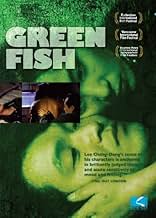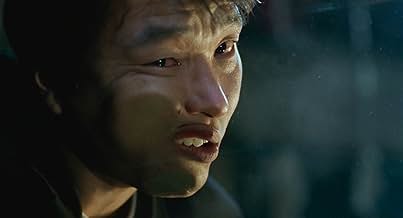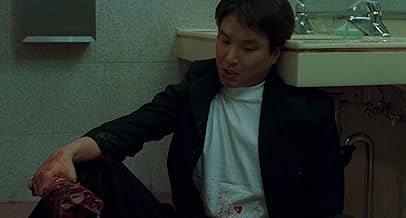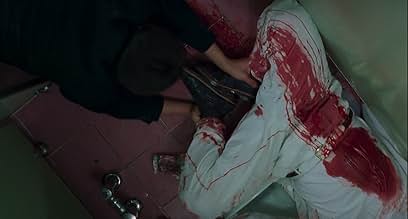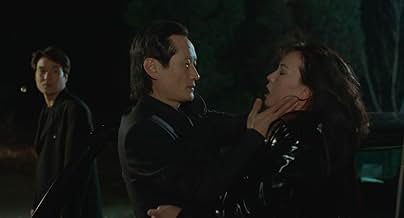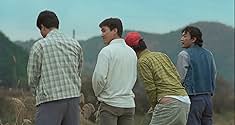NOTE IMDb
7,0/10
2,4 k
MA NOTE
Ajouter une intrigue dans votre langueReturning home and finding his town drastically changed, a former soldier falls in with gangsters.Returning home and finding his town drastically changed, a former soldier falls in with gangsters.Returning home and finding his town drastically changed, a former soldier falls in with gangsters.
- Réalisation
- Scénario
- Casting principal
- Récompenses
- 20 victoires et 6 nominations au total
Kim Dong-gon
- Sandwich Man
- (as Dong-gon Kim)
Lee Ho Sung
- Elder brother
- (as Ho-Sung Lee)
Park Hye-Sook
- 3rd Brother's wife
- (as Hye-sook Park)
Avis à la une
This is director Lee Chang-Dong's first film (of three) and the third that I've seen after his well-made films Peppermint Candy and Oasis. It's a story of a young man who is recently discharged from the standard military service that young Corean men are required to serve and finds that life, or the real world, is a lot harsher than his idealistic self would've expected. He soon finds himself dragged into the Corean underworld out of necessity and finds his idealism and the idealism of all those around him at odds with reality.
In a greater sense, this film is about the constant struggle between chasing your dreams and dealing with the harsh reality. All the primary characters, the mob boss, the female lead and the protagonist all have their dreams and ambitions (building a great property from the ashes of his youth, escaping the prostitute's life and living a normal one, owning a restaurant with his family), but are struck by the world's reality, which forms itself as an enemy mob, the mob bosses' controlling nature and the young protagonist's dysfunctional family.
It's a study of the nature of the relatively modern world (of Corea) and the inevitable clash of youthful idealism and experienced reality. And it doesn't take too many sides either, although the ending does seem to show that action, and sacrifice, even unintended, is what's necessary to keep yourself from being beaten down by reality.
It's a slowly-paced art film with quiet but contemplative character development, modest acting and capable directing. Directer Lee still hasn't fully gained a strong grasp of storytelling yet as a director at this point as the film as it's sometimes difficult to make out why anything's happening in the film, but the potential shows as well, with honest characters and patient development. A good start, but you can see the Director side of Lee Chang-Dong really start to pick up with his later films. It's decent. 7/10.
In a greater sense, this film is about the constant struggle between chasing your dreams and dealing with the harsh reality. All the primary characters, the mob boss, the female lead and the protagonist all have their dreams and ambitions (building a great property from the ashes of his youth, escaping the prostitute's life and living a normal one, owning a restaurant with his family), but are struck by the world's reality, which forms itself as an enemy mob, the mob bosses' controlling nature and the young protagonist's dysfunctional family.
It's a study of the nature of the relatively modern world (of Corea) and the inevitable clash of youthful idealism and experienced reality. And it doesn't take too many sides either, although the ending does seem to show that action, and sacrifice, even unintended, is what's necessary to keep yourself from being beaten down by reality.
It's a slowly-paced art film with quiet but contemplative character development, modest acting and capable directing. Directer Lee still hasn't fully gained a strong grasp of storytelling yet as a director at this point as the film as it's sometimes difficult to make out why anything's happening in the film, but the potential shows as well, with honest characters and patient development. A good start, but you can see the Director side of Lee Chang-Dong really start to pick up with his later films. It's decent. 7/10.
If you're looking for a good story that'll leave you awe-stricken or at least satisfied, then you've chosen the wrong film. How a man in his mid twenties can be naive on the par with a 14 or 15 year old just isn't plausible in the real world, especially in the late 90s, unless he is retarded. And the lead character is not retarded. Another idiocy of the film is that the lead who is, and looks obviously to be, in his mid 30s is playing a naive, almost moronic 24 year old. The film is hogwash, and I was annoyed after wasting almost 2 hours watching it.
I see this as a film about how hard it is to do the right thing in the complex modern world. Makdong's family used to own acres of farmland that are now covered in ugly apartment buildings and now they get by selling eggs to the residents. All Makdong wants to do is make this easier for his family and in the process he becomes a gangster just to get by. Even the gangsters are between doing the right thing and doing what they must to survive. Makdong's "Big Brother" likes to think of himself as different from the other thieves and killers that make up the underworld but in the end he is no better.
Lee Chang-Dong's movie have common themes I have noticed as I move backwards through his oeuvre. Male protagonists romance story tied up in a class system or one hierarchical social structure or another. Its about the indignation and class struggle, being mislead by the bright lights, whether it be women fame or fortune. The good are seldom rewarded and success is not won by having principles. Its more like a 'dogme 95' movie than a hollywood affair.
Its not overly violent and the overall tone is kinda light considering the bleak outcome of the story, conveying the absurdity of life rather than looking at it in a nihilistic way. City scapes contrast with rural city outskirts as do the inhabitants; this again puts it in similar ground to his latest movie Burning, which has alot in common with this one in many thematic ways. I would say that his fim making skills have grown and Burning was better, the cinematography for one thing is superior in the latter.
Lee Chang-Dong recently got a lot of attention when his latest movie OASIS one multiple Korean awards. OASIS is a unique movie that examines of the lives and loves of characters who normally do not get much attention from cinema or the public. It's an unusual sort of love story, and was a bad choice to watch with my girlfriend on Valentine's Day. Chang-Dong's directorial debut GREEN FISH is a far less ambitious film, but still shows the work of a talented and mature director.
Makdong (Han Suk-Kyu) is a naive young man who returns home after his spell in the army full of hopes and (small) ambitions. Now that he's a man, he wants to make a lot of money and be able to look after his family. Unfortunately, when he gets home he is treated to a little dose of reality. The area is economically depressed, and his family are not the close loving unit he wishes them to be.
Making lots of money proves to be a lot more difficult than he anticipated, as jobs in the area are pretty scarce. One area that does offer employment is crime, as the area is controlled by the gangs. A chance encounter with a young woman leads him to meet a gang boss who seems to be a little more respectable than most, and when he's told he won't have to break the law he accepts a job.
The boss takes a liking to Makdong's simplicity and straightforward character and looks after him well, to the resentment of other members of the gang. Despite the promise of legitimacy, he learns that gangs cannot really live by the law, and he gets drawn further into the criminal life.
GREEN FISH is a distinctly Korean film, which is not to say that all Korean films are the same (clearly not the case), but there are a few styles of film that do seem especially Korean, and this is one of them. It is a slowly paced and subtle film, allowing the story and characters to reveal themselves indirectly through the strength of the acting. The cast are all strong actors, and this allows the style of film to work. The story of an innocent young man drawn into the gangster world is not really a new one, and GREEN FISH does not try to add much that is new to it. It just focusses on the characters, their hopes and conflicts and their disappointments. The tone is not one of hope or happiness, with economic worries making reality hard. None of the characters in the movie are angels and none are devils - instead they are much more realistic human beings, full of good intentions and weaknesses.
GREEN FISH is perhaps a little too subtle, or perhaps the actors are not quite good enough for the director's ambitions. Either way, the characters remain a little vague to us, and our involvement with their stories is hence slightly diminished. It is still a movie of strong characters, however, and a well told story until the slightly weak ending.
Korea produces some very strong dramas, with a high level of "art" being found in much of the nation's cinematic output. GREEN FISH is an accomplished debut that fits well with recent Korean cinema, though it is a little too conservative to be classed in the higher ranks. Good for a first film though, and Lee Chang-Dong is definitely a director to keep an eye out for.
Makdong (Han Suk-Kyu) is a naive young man who returns home after his spell in the army full of hopes and (small) ambitions. Now that he's a man, he wants to make a lot of money and be able to look after his family. Unfortunately, when he gets home he is treated to a little dose of reality. The area is economically depressed, and his family are not the close loving unit he wishes them to be.
Making lots of money proves to be a lot more difficult than he anticipated, as jobs in the area are pretty scarce. One area that does offer employment is crime, as the area is controlled by the gangs. A chance encounter with a young woman leads him to meet a gang boss who seems to be a little more respectable than most, and when he's told he won't have to break the law he accepts a job.
The boss takes a liking to Makdong's simplicity and straightforward character and looks after him well, to the resentment of other members of the gang. Despite the promise of legitimacy, he learns that gangs cannot really live by the law, and he gets drawn further into the criminal life.
GREEN FISH is a distinctly Korean film, which is not to say that all Korean films are the same (clearly not the case), but there are a few styles of film that do seem especially Korean, and this is one of them. It is a slowly paced and subtle film, allowing the story and characters to reveal themselves indirectly through the strength of the acting. The cast are all strong actors, and this allows the style of film to work. The story of an innocent young man drawn into the gangster world is not really a new one, and GREEN FISH does not try to add much that is new to it. It just focusses on the characters, their hopes and conflicts and their disappointments. The tone is not one of hope or happiness, with economic worries making reality hard. None of the characters in the movie are angels and none are devils - instead they are much more realistic human beings, full of good intentions and weaknesses.
GREEN FISH is perhaps a little too subtle, or perhaps the actors are not quite good enough for the director's ambitions. Either way, the characters remain a little vague to us, and our involvement with their stories is hence slightly diminished. It is still a movie of strong characters, however, and a well told story until the slightly weak ending.
Korea produces some very strong dramas, with a high level of "art" being found in much of the nation's cinematic output. GREEN FISH is an accomplished debut that fits well with recent Korean cinema, though it is a little too conservative to be classed in the higher ranks. Good for a first film though, and Lee Chang-Dong is definitely a director to keep an eye out for.
Le saviez-vous
- ConnexionsFeatured in Son-nim-eun-wang-e-da (2006)
Meilleurs choix
Connectez-vous pour évaluer et suivre la liste de favoris afin de recevoir des recommandations personnalisées
- How long is Green Fish?Alimenté par Alexa
Détails
- Durée
- 1h 51min(111 min)
- Couleur
- Mixage
- Rapport de forme
- 1.85 : 1
Contribuer à cette page
Suggérer une modification ou ajouter du contenu manquant

